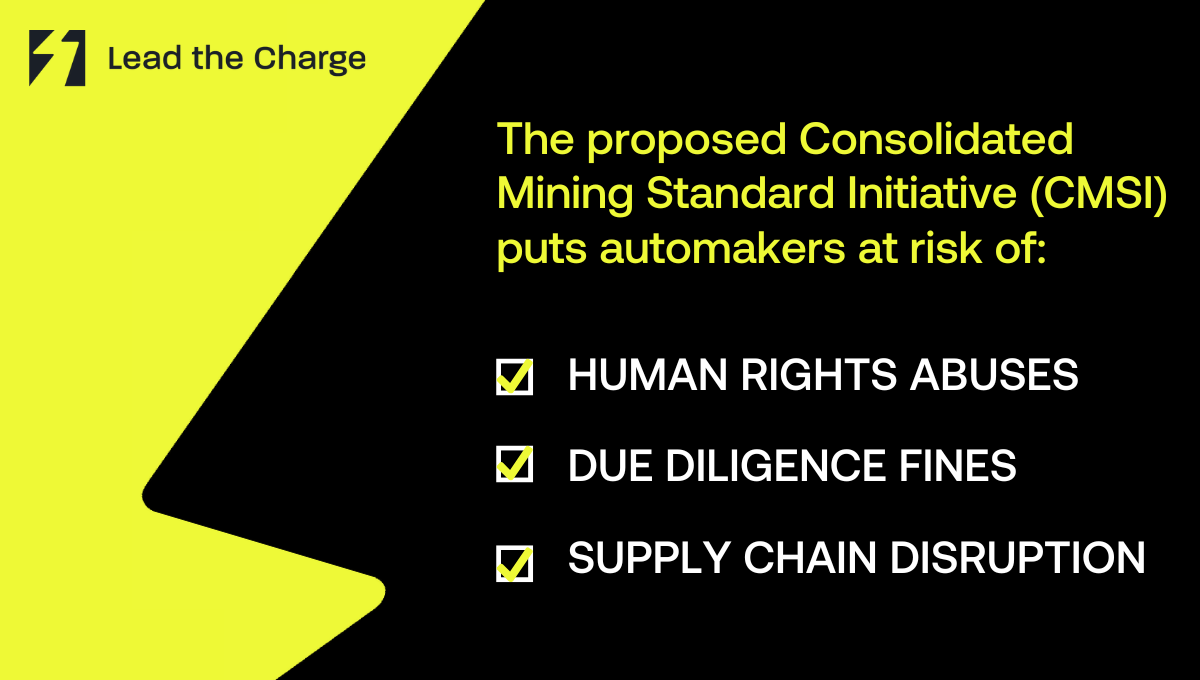Today, Lead the Charge member organizations including Mighty Earth, SIRGE Coalition, Public Citizen, Earthworks and Transport and Environment endorsed a policy brief for automakers in response to the draft Consolidated Mining Standard Initiative. The executive summary of the brief is below; the full brief can be found here.
Executive Summary
This brief is the product of a collective effort by civil society, Indigenous rights and labor organizations to communicate critical findings and underscore key risks posed by the Consolidated Mining Standard Initiative (CMSI) to communities, workers, ecosystems, investors and downstream minerals purchasers.
The mining industry is attempting to develop a new voluntary ‘global mining standard’ through the CMSI. The initiative aims to merge the existing principles and industry standards of the Copper Mark, the International Council on Mining and Metals (ICMM), the Mining Association of Canada’s Towards Sustainable Mining (MAC TSM), and the World Gold Council (WGC).
There are four draft documents published by the CMSI that are currently under consultation through December 16, 2024: the Standard, the Assurance Process, the Claims and Reporting Policy, and the Governance Model. The standard is organized into 24 Performance Areas (with one or more topics covered in each), which are further divided into three practice levels: Foundational, Good, and Leading. Voluntary standards cannot replace the need for mandatory human rights and environmental
due diligence, and “at best should be seen as one source of information about a company’s practices.”
Strong voluntary standards can help drive improved mining industry human rights and environmental performance only if they have the level of transparency, rigor and independent oversight necessary to provide credible information and require companies to continuously improve based on independent audit findings.
Nevertheless, common problems of voluntary standards include a lack of transparency, inadequate oversight and accountability, the exclusion of affected communities and workers in the assessment process and overall governance of the schemes, and large divergences in the quality of results based on what they actually evaluate.
This analysis reveals several gaps in the current draft consolidated standard, including:
1. The standard is too vague to provide meaningful guidance to companies and to enable effective auditing;
2. Non-conformance with fundamental international laws, principles, and guidance that protect the rights of Indigenous Peoples;
3. The lack of alignment with widely accepted international standards already used by industry;
4. Misalignment with government-backed international principles (the UN Guiding Principles on Business and Human Rights, or ‘the UNGPs’) and guidance that promote responsible business conduct in supply chains (the Organization for Economic Cooperation and Development Guidelines for Multinational Enterprises on Responsible Business Conduct, or the ‘OECD Guidelines’);
5. An assurance process that gives mining companies too much control, compromising its independence;
6. An assurance system that lacks guidance, adequate accreditation, and oversight, making independent, reliable audits improbable;
7. A governance model that gives mining companies too much control over processes that impact the standard’s accountability measures; and
8. There are no incentives within the CMSI for companies to move beyond Good Practice for any Performance Area.
Given these gaps, the draft consolidated mining standard poses the following risks to automakers and other downstream purchasers:
Risk #1: The standard will award passing grades, such as Foundational, Good or even Leading Practice, to mines that continue to perpetrate serious human rights abuses or environmental harms, exposing automakers to human rights abuses in their supply chain.
Risk #2: The standard does not go far enough to support users in conducting rigorous due diligence. With forthcoming EU due diligence requirements, this could put automakers at risk of fines and loss of market access.
Risk #3: The weaknesses of the Standard’s criteria, Assurance process, and Governance Model open automakers up to financial risks and risks of supply chain disruptions.
As currently written, the first draft of the consolidated standard does not support responsible sourcing.
It sets a low bar for companies’ social and environmental performance and fails to establish the assurance and governance systems necessary to prevent harmful industry practices from going unchecked. If used in current form, it would add to, not reduce, the reputational, operational, and financial risks of mineral purchasers (including automakers, investors, governments, and other actors along mineral supply chains) using the standard.
We urge automakers and downstream purchasers to send a clear message to the mining industry that vague standards that fall short of international minimum standards, coupled with opaque assurance and a flawed governance process, are not an acceptable mechanism for monitoring human rights and environmental harms.
Read the rest of the brief on the Public Citizen website.
